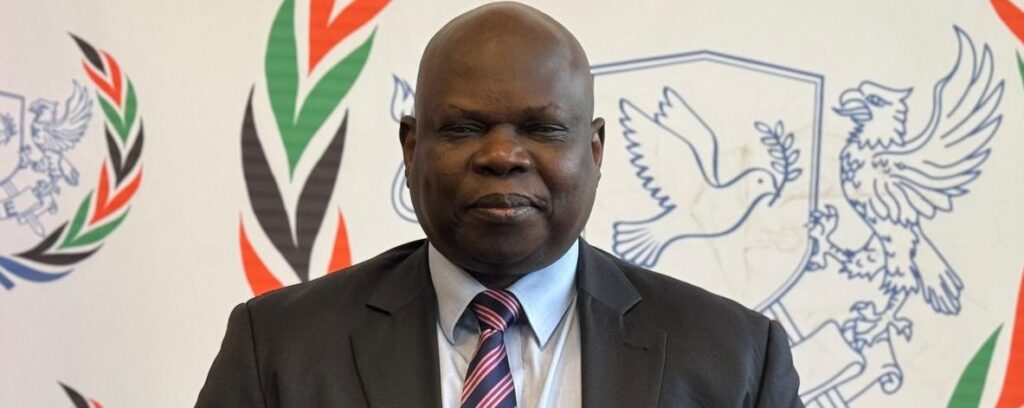Pagan Amum Okiech, the leader of the opposition Real SPLM at the Tumaini (hope) Peace Initiative, praises the mechanisms adopted to ensure the full implementation of the agreement and the democratic transition.
In this second and final segment of an exclusive interview with Radio Tamazuj, Mr Amum, who also leads a faction of the holdout group, the South Sudan Opposition Movements Alliance (SSOMA), emphasized that the Tumaini Initiative is the only peace process that can resolve the crisis facing South Sudan.
Below are edited excerpts:
Q. What do you know about the High Level Committee that toured the region on the Tumaini?
A. It seems the High Level Committee that toured the region failed to achieve its objective to kill Tumaini after President William Ruto visited Juba on the invitation of President Salva Kiir. We hope that the government is ready to finalize the Tumaini Initiative so that we can sign a final agreement within two weeks. We hope that the government will be serious and will not call for the renegotiation of the agreement that lasted several months.
Q. There are reports that some government officials were uncomfortable with the power-sharing protocol because they might lose their positions. What is your take?
A. The Vice-President, Dr James Wani, recently said he was for peace and the government was ready for the same, but some individuals were afraid that they might lose their positions after the signing of the Tumaini agreement, and that they put their interests before public’s.
Q. Do you, as the opposition, have any concerns about a possible change of the government delegation to the Tumaini Initiative?
A. It is not a big concern whether there is a change of personalities in the government delegation. We are negotiating with the transitional government, not individual parties.
Q. What makes the Tumaini Initiative different from the 2018 agreement that stalled in Juba?
A. Based on our experiences, we have come up with proposals and suggestions that led us to a number of mechanisms that are strong enough to ensure the full implementation of the agreement.
Since independence, this government has failed to implement agreements and we found that there was a lack of a transparent management of public resources and therefore came up with mechanisms that ensure transparency and accountability in the management of resources and ensure the implementation of the agreement.
In addition, we identified weaknesses in the previous agreements, especially in the mobilization of resources internally and internationally and we agreed to hold a donor conference, and the new mechanism for the management of resources will encourage the donors to contribute and participate in the implementation of the Tumaini consensus.
The mechanisms that we adopted under Tumaini give representation to the donors and the international partners to monitor the use of the resources, especially the funds that will come from them. All these mechanisms and provisions of the agreement will ensure the implementation of the agreement internally, regionally and internationally.
Q. How will Tumaini rescue South Sudan from collapse?
A. As I mentioned earlier, Tumaini is a program to rescue South Sudan from chaos and collapse and disintegration because of failure to transition the government democratically. South Sudan is currently at a crossroads, and after we sign the Tumaini consensus, we will embark on mobilizing the people to support the agreement. We want them to use Tumaini to change the situation from risks to unity, rebuild their lives and realize peace and democracy.
We appeal to the people and the political forces to unite to rescue South Sudan from collapse because tribalism has destroyed harmony and unity. This is the only option we have currently to rescue our country from collapse.
Q. What new mechanism do you have to address the current economic woes when you join the government?
A. The mechanism and the solution is the Tumaini consensus. It has a program to rescue the situation because it has a mechanism for a transparent management of public resources and the building of good governance and the democratic transition. The protocols of the Tumaini address a number of issues, including humanitarian and environment and economic crises.
Those protocols of course will not solve the issue immediately, but if the people of South Sudan support the agreement and we start implementing it fully, we can rebuild the country, address the economic challenges, and open up opportunities for the people to rebuild their lives, whether in urban, rural areas or IDP camps. We need to change the situation, to find a solution so that our refugees, including in Sudan where conflict is raging, can come home.
Q. What is the update on trust and confidence building between the opposition and the government? When do you plan to visit Juba?
A. After the signing of the agreement, we will launch a campaign to create awareness in the country about the new agreement. Regionally and internally, there will be a campaign to ensure success in the implementation of the agreement to rescue South Sudan from collapse.
Q. What is your final message?
A. The current situation in South Sudan requires a unity of purpose by the people and the political parties. South Sudan is at a high risk and we should prioritize the public interest. That is what is required right now.




